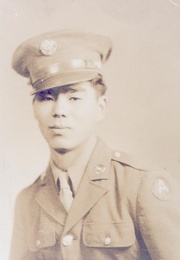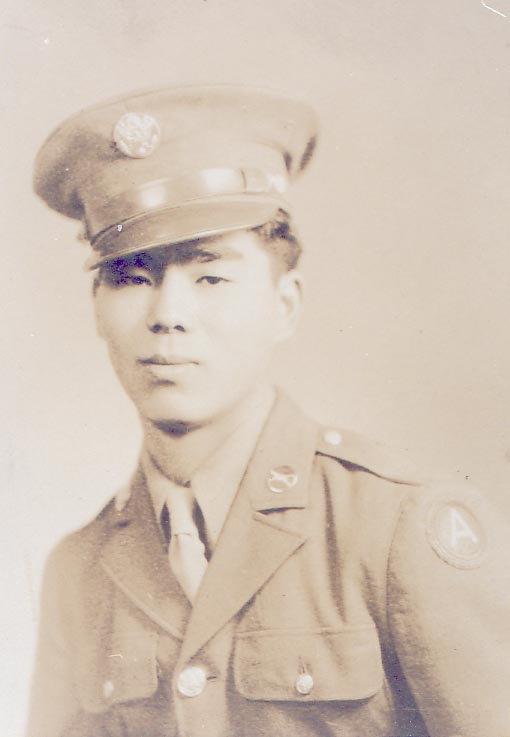
Japanese American Military Experience Database

Rikio "Riki" Tsuda
Asiatic Pacific Service Medal
WWII Victory Medal
Good Conduct Medal
Purple Heart
Bronze Star
On June 26, 1944, we were fighting in the vicinity of Belvedere, Italy. Our mission was to occupy an enemy house to control the highway and cut the route of escape of all enemy vehicles in the vicinity. We achieved our objective, capturing numerous amphibious vehicles and weapons, and capturing 17 and wounding 7 of the enemy. For my action in achieving this objective, I was awarded a Bronze Star Medal.
Silver Star
On April 14, 1945, while protecting the town of Castalpogio in Italy, my platoon was charged by enemy troops firing bursts of automatic weapons fire. We stood our ground and silenced an enemy machine gun and repelled the enemy. Fortunately, there were only a few casualties suffered by our platoon and for my role in this skirmish, I was awarded a Silver Star medal
Distinguished Unit Citations
June 26-27, 1944: For outstanding performance in destroying the left flank of German defense position near the town of Belvedere. The Battalion killed at least 173 Germans and captured 73 and forced the remainder of the disrupted enemy flank to surrender their ground.
Oct. 15-30, 1944: For outstanding accomplishment in combat during this period near Bruyeres, Biffontaine and in the Foret Domaniale de Champ, France, which included the rescue of the 'Lost Battalion' (1st Bn., 141st Inf., 36th Div.).
Apr. 5-14, 1945: 100th/442nd RCT, 232nd Combat Eng. Co.: For outstanding accomplishment in combat during this period: Broke the western anchor of the Gothic Line which withstood the efforts of friendly troops for 5 months in which to improve their position.
b. Bathed in ditches and streams, occasionally QM Mobile Shower.
c. Ate K or C rations during combat; kitchen meals whenever available.
d. For entertainment, we visited with Italian families; looked forward to R&R passes; enjoyed drinking beer with buddies.
I was one of 287 officers and enlisted men in the 2nd replacement group sent from Camp Shelby to join the 100th Infantry Battalion. I was attached to Company B; and I received only two days of training in combat situation with the 'old timers' before the 100th was sent to the front line area along the Mussolini Canal and relieved the battalion of the 34th Infantry Division. This area was pockmarked with shell holes as the German artillery had shelled the area constantly. Absolutely no activity was allowed during daylight hours. Every man had to remain in farmhouses or dugouts in the back of shelled-out houses. Even toilet 'duties' had to wait until after dark as the German artillery was positioned on the high ground surrounding the Mussolini Canal and farmlands and every movement, even a lone soldier, if spotted, would invite a barrage from the deadly 88mm rifles.
After sunset, the 'beach rats,' as we were called, became alive. Every squad was assigned duties. Our first night duty was to bury dead German soldiers who were killed in action during attacks against the 34th Div. element, two or three weeks prior to our arrival. Several bodies had not been recovered when the Germans retreated and the stench was unbearable. Other duties consisted of patrols, manning listening posts, picking up supplies and water from the rear, manning machine guns along the canal wall, occupying foxholes on the front line 24 hours at a time. During free time, some would pick watercress along the shallow parts of the canal so there was no shortage of fresh vegetables. Occasionally, cows would get shot 'accidentally' behind the line and when that happened, word got around real fast and guys from other platoons equipped with sharp knives did not waste any time helping themselves to parts of the cow which they took back to their squads.
One night around the middle of May, our platoon sergeant told our squad leader that our squad was assigned to capture prisoners. That was scary because we had no idea how we could sneak up on them, much less capture them, while they were in their highest state of alert. But being paid for a hazardous job, we had no chice in the matter. Our platoon sergeant wanted to lead the squad himself but he was overruled. We were briefed by the C.O. himself: 'Leave your wallet and anything else that will identify you other than dog tags taped together; only one bandolier of M1 ammo and no cartridge belt or anything that rattles; if you're fired upon, return; if wounded, try and make it back on your own because we may not be able to go and get you; if captured, you know your code of conduct for POW's.' So with that briefing, nine of us set out past the front line and crawled most of the way on our bellies as we had only an inkling where we would find a German outpost. After what seemed like hours, we came to a stop when we heard clicking sounds like someone was cocking a machine gun. All of a sudden, it happened; tracers flying all around and over our heads; four or five potato mashers (German hand grenades) were tossed at us but only one actually hit their target - our squad leader's face - and bounced off before exploding about five feet away. Incredibly, no one was injured - only the one black and blue face. Of course, we withdrew as we were ordered to do. When we returned to the line, no one had expected to see us back.
The following night, Capt. Young Oak Kim volunteered to bring back prisoners and took Sgt. Irving Akahoshi, several riflemen and a BAR man to cover just in case, and, of course, they were successful and brought back two prisoners. Dr. Thomas Murphy's 'Ambassadors in Arms' and several other books describe the cunning moves by the legendary captain in capturing those prisoners. As for the failed mission, nothing was written or mentioned in battalion journals or anywhere else about the 1st squad, 3rd platoon of Co. B, which was nearly clobbered in the tall grass in no man's land of Anzio Beachhead.


